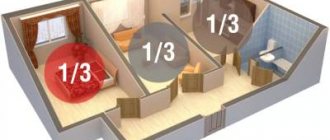Read on our website about how to find out whether an apartment has been privatized, where to start the privatization process, who can register the property, how to write an application for privatization, whether it can be submitted through the MFC, and whether it is better to entrust the process to a real estate agency or another person by proxy.
Legal subtleties of the procedure
Is it possible to split bills in a privatized apartment?
The very concept of “separation of accounts” does not correspond to modern legal terminology. This is what is called at the household level the allocation of a share in the payment of housing and communal services to each owner of a share of the apartment.
Allocation can be made only if the property is registered as shared ownership , and each of the residents has a Certificate of Ownership with the dimensions of the living space in their possession stated in it.
When creating a personal account assigned to the owners of a specific premises, the law is based on the following key points:
- living space area;
- the number of residents registered in it.
Based on these circumstances, an agreement on payment for utilities and maintenance of the local area is drawn up.
The agreement is concluded with one of the share owners, whose name appears on the payment. Moreover, each owner has equal rights to use the premises and obligations to pay the receipt.
Based on these circumstances, in fact, the bill for housing and communal services already implies equal responsibilities of the owners to pay for it.
But in practice, it is not always possible for each of them to peacefully agree on the payment of equal amounts on a receipt, which is why there is a need to generate a separate payment document for each .
Division is possible only if the following conditions are met:
- A separate account can be issued only for the owner of the share. Registration without owning a share in the living space does not give the right to have a personal account.
- Division is possible only in privatized housing . According to the new housing code of the Russian Federation, dividing accounts in a municipal apartment is not permissible.
The formation of a separate payment is made only on the basis of the Certificate of Ownership.- You cannot split bills if the apartment is one-room .
According to the law, the presence or absence of family ties among the owners of the premises does not in any way affect the process of allocating everyone’s share of payment.
Application form to housing and communal services for division of a personal account in a privatized apartment.
Sample statement of claim to court for division of personal account.
You can learn about the concepts of paid and free privatization, what tax are required to pay and what owners of privatized apartments must repair at their own expense, as well as how to give up your share or go through the process of deprivatization of residential premises.
How to check template status
The status of the template can be checked by opening the “File Import/Export Result” tab in your personal account. You will see a list of all the templates that you have already uploaded to the site. Note that the status of the template can and should be checked, since the site only indicates whether the file has been processed or not, and only inside the downloaded document will it be indicated where you made the mistake.
Under the checkbox, the “Save processed file” function is offered; the document will be downloaded in Excel format. The status of the object is indicated in the last column of the table, which is called “Processing Status”. If the background is red, then there are errors. The program does not write how to correct them, so you will have to check the entire table again. If “Ok” is written in the “Processing status” column, then the table was processed successfully.
Methods
How is personal accounts in a privatized apartment divided into shares? It is possible to allocate each owner's share to pay utility bills in privatized housing either peacefully or by going to court . Each of the options for this division has its own rules and features.
You can learn about the rights and responsibilities of the owner and those registered in a privatized apartment from our article.
Through the management company
How to divide bills in a privatized apartment? If all property owners agree to determine their shares for payment, division can be made by submitting an application to the Criminal Code. Each share owner must draw up a document and attach a copy of the Certificate of Ownership to it.
Utility workers will document several personal accounts for the apartment, evenly distributing all payments between the owners.
After this procedure, each of them will receive a separate payment document. From now on, responsibility for paying for housing and communal services will lie with each share owner.
Splitting a single receipt into parts does not mean turning the apartment into a communal one, and does not entail a redistribution of shares between the owners.
This procedure only determines the procedure for payment for consumed services and does not affect the property rights of citizens who own shares.
Through the court
How to separate housing and communal services accounts in a privatized apartment through the court?
If one of the owners does not want to carry out the division on a voluntary basis, each of them can file an application with the court.
In the claim, the applicant must ask the court to divide the bills according to their shares in the living space.
The application must be accompanied by a package of documents consisting of the following items:
- copy of the passport;
- technical passport and floor plan of the facility;
- extract from the house register;
- copy of personal account;
- receipt of payment of state duty (its amount is 300 rubles).
Such cases are under the jurisdiction of magistrates, and their consideration is carried out according to a simplified procedure. To consider the case, the presence of all owners of the premises is not required; the presence of the applicant, the owner of one of the shares, .
The court hearing is held after 30 days from the date of filing the application. 10 days after the court hearing, the owner receives a Resolution.
Having a court ruling in hand, the owner applies to the Criminal Code with an application to allocate each owner a share in paying for housing and communal services. The division will be made on the basis of the resolution , and from now on a separate receipt will be generated for each person living in the apartment.
If the owner of the apartment is one person, and the rest of the family members are only registered in it and are not shareholders, it is impossible to allocate accounts for them .
The owner should try to force them to pay for housing and communal services in other ways.
Find out on our website about in what cases a refusal may be received in the procedure for the privatization of residential premises, whether it is possible to privatize a cooperative or service apartment, as well as an apartment for a military personnel or an apartment with rent arrears, and how to conclude an agreement for the transfer of housing into ownership if it is lost order.
Dividing a personal account to pay for utilities
How to divide rent between owners? Before going to court, you need to understand the full extent of the problem. The main thing that needs to be achieved is the division of utility bills. How to do it? We will enlighten you. Read the article further.
Initially, it is necessary to state the fact that invoices for payment come in the name of the owner of the property or in the name of the responsible tenant (if people live under a social tenancy agreement).
And if, for some reason, he does not want to pay for everyone, and the other residents refuse to pay for utility services, then the person will try to change the situation.
Of course, it is necessary to try to solve the problem peacefully. To do this, you can enter into an agreement to allocate one or more shares of the rent. Document this and go to the management company with the appropriate application.
Expert commentary
Roslyakov Oleg Vladimirovich
Lawyer, specialization civil law. More than 19 years of experience.
Ask a question
Often it is not possible to reach an agreement. The causes of the conflict lie so deep that you have to go to court with an application to split the payment of utility bills.
Rules for drawing up an application
An application for the allocation of shares for payment of housing and communal services must contain the following points:
- Information about the applicant (full name, passport details, telephone number).
- Information about the persons for whom additional accounts are required.
- Indication of the size of the owners' shares (based on Certificates).
- Signatures are the consent of all owners.
Where to contact?
The simplest option is to submit an application to the management company (homeowners' association) to which the residential premises belong.
A more complex and costly method would be to file a claim with the district (city) court at the location of the real estate. However, this option will remain the only one if there is a dispute between the owners, one of the co-owners evades participation in sharing the burden of maintenance costs, or if the management company refuses.
If the property is joint
Is it possible to split accounts in a privatized apartment if it is jointly owned by spouses? During the privatization process, some apartments are registered not as shared ownership, but as joint ownership .
Such registration is carried out in the case of privatization of an apartment by spouses, who become co-owners and equal owners of the living space.
In the event of a divorce and the spouses continue to live together in the same territory, the question of separate payments arises quite often, since people maintain separate households and not always both regularly contribute funds to pay for housing and communal services.
In such situations, the question of dividing accounts inevitably arises, but dividing it in these circumstances is impossible. To solve the problem in this case, you need to start by changing the form of ownership of the apartment.
You should start by drawing up an agreement on dividing the living space into shares . To draw it up, you should contact a notary, who will determine the specific procedure for the owners.
After division into shares, each owner receives a Certificate from Rosreestr. This document will be the basis for dividing invoices for payment.
With this document, the owners turn to utility companies to generate accounts and draw up a separate agreement for the provision of services for each owner of the share.
You can find out what the statute of limitations is for declaring the privatization of an apartment invalid, as well as who has the right to re-privatize a residential premises, from our articles.
Classification code of the house in FIAS
It is important to remember that the personal account is tied to the premises, so you need to find out the house code in FIAS (Federal Address Information System - a database of all addressable objects in Russia). Please note that the column “House code in FIAS” is marked in yellow in the table, i.e. is optional, but without this code your application will not be processed.
How to recognize him? On the main page of the GIS Housing and Communal Services portal, find the “Electronic Services” tab, click the “All Services” button, and then the “Find out the house code in the GIS Housing and Communal Services” button:
After clicking it, the “Receiving information at home address” window will pop up:
Fill out the lines and click on the “Get information” button. When the codes are displayed, simply save the one you want.
For information about who should enter information about houses in the GIS Housing and Communal Services: Management Company or Homeowners Association, read this article
Refusal from the management company
Utility companies do not always welcome the division of bills for apartments in shared ownership, since in case of non-payment of bills it is easier for them to deal with one owner rather than with several.
The only way out in such a situation is, again, to file a lawsuit in court , since such actions of the Criminal Code are a violation of the law.
If it is impossible to achieve agreement on paying for housing and communal services, there is no need to waste time on endless financial disputes with the other shareholders. Divide the bills, and the reasons for financial disputes will disappear , and your life will become calmer.
Consultation with a lawyer on the topic of dividing a personal account in a privatized apartment in this video:
Causes
The underlying reason for wanting to split accounts is financial. Some owners are irresponsible when it comes to paying for housing and communal services, and believe that the one in whose name the receipts come should pay. But this is not true.
All owners, as well as other persons registered in a privatized apartment, are required to contribute funds in equal shares for utility costs.
Often such disputes arise between ex-spouses. One person stops paying, the second, unable to cope, accumulates debts. If the first does not yet have an official source of income, but the second does, then again the bailiffs will collect the debt from him.
It may happen that one of the two owners pays only half the amount, although he has children who are registered at this address. Since most utilities are based on the number of people, it is fair for a parent to pay for their children rather than half the amount. There are many similar disputes, but it all comes down to one thing: someone pays and someone doesn’t.
New rules for treasury support in 2021
The legislation updated the procedure for treasury support in 2020. Supervision is carried out over the target budget allocated to state and municipal organizations and over the implementation of national projects:
- subsidies and budgetary investments of legal entities;
- contributions to authorized capital and contributions to the property of legal entities through government subsidies and budget investments;
- advances under contracts concluded by recipients of funds;
- advances under contracts concluded to fulfill the conditions for the issuance of subsidies and concession agreements;
- mutual settlements under government contracts with a single supplier under clause 2, part 1, article 93 of 44-FZ, worth at least 300 thousand rubles;
- mutual settlements under agreements within the framework of state defense orders worth at least 300 thousand rubles;
- budget allocated to institutions and individual entrepreneurs in cases provided for by the Government of the Russian Federation.
Treasury support is not provided for government contracts for the examination of design documentation, the results of engineering surveys and services for accepting payments from individuals carried out by payment agents.
FC oversees all major customer contracts, which are financed from the federal budget. The legislation specifies the inclusion of information about banking and (or) treasury support in the notice, procurement documentation and draft contract drawn up in accordance with 44-FZ.
According to Letter of the Federal Treasury No. 07-04-05/22-18684 dated 08/29/2019, from 09/01/2019, territorial bodies of financial companies are required to reserve and open single personal accounts with code 71. A single 71 personal account for treasury supervision is necessary to take into account transactions NUBP is a non-participant in the budget process. This account is needed by the main contractors to receive payment for the supply of goods, works or services, and for legal entities receiving targeted funds from government subsidies and budget investments under relevant agreements.
How to privatize an apartment with separate personal accounts?
The procedure for privatization of housing in Russia is reflected in Law No. 1541-1 of July 4, 1991 “On the privatization of housing stock in the Russian Federation.”
Article 2 of this law establishes that citizens living in housing under a social tenancy agreement have the right to purchase housing as common property or as the property of one person, including a minor.
Every Russian citizen has the right to take part in free privatization once, provided he has permanent registration in a municipal apartment.
The decision to privatize must be unanimous. One or more persons have the right to refuse to participate in the transaction (but must give notarized consent to privatization) in favor of the future owners. Residents who refuse have the right to permanent residence in a privatized apartment.
The legislation does not provide for the registration of ownership of part of the housing, so the apartment is privatized:
- only entirely in shared ownership;
- or into the property of one of the registered persons, subject to the refusal of the remaining persons.
To acquire ownership rights to a part of an apartment, a mandatory condition is the allocation of this part in the form of a separate share in kind.
Since the law prohibits the privatization of a part of a common object, the possibility of acquiring ownership rights to a share appears when it becomes a separate object.
The transfer of ownership of rooms in a communal apartment in which residents have separate personal accounts is called partial privatization. When rooms in a communal apartment are privatized, the share of ownership will correspond to the size of the occupied room.
There is another, more complex option for privatizing part of an apartment - drawing up a separate social tenancy agreement for residential premises. If several families living in a communal apartment are on bad terms with each other, then moving away may be a way out of this situation.
If it is not possible to exchange an apartment, then residents can determine the procedure for using the residential premises voluntarily or in court. After which you should contact the owner of the real estate to conclude a separate social rental agreement and privatize the allocated room.
On support of the government contract by the Treasury
In 2021, the issue of treasury support has become relevant again. This is explained by the fact that previously this process was carried out according to the provisions of 275-FZ - in relation to obligations under state defense orders. Now control over the funds allocated to the customer is also carried out as part of the implementation of contracts under 44-FZ. With the help of this instrument of state control in 2021, the efficiency of spending budget funds is determined.
To receive a free consultation as part of tender support, simply fill out the feedback form or call
Targeted funds are financing of a budgetary enterprise to fulfill the goals and conditions outlined by higher departments. The intended use of money must be strictly for its intended purpose - for the purchase of goods, works and services necessary to meet the needs. Recipients of budget funds are required to open special accounts in branches of the Federal Treasury (FC).
FC support is carried out in accordance with the rules approved in Government Decree No. 1765 of December 30, 2018.
Treasury support (TS) is especially in demand for vital and defense tasks or state image projects, for example, such as:
- construction of the Vostochny cosmodrome;
- implementation of national projects;
- construction of facilities for the World Cup;
- construction of the Crimean Bridge;
- construction of museum and theater-educational complexes.
The projects being implemented are so large-scale that they require the involvement of a large number of participants from the commercial environment. Therefore, it is important not to break the chain of control of funds allocated for exactly the purposes for which they were intended.
The CS allows you to manage the risks of the state customer in connection with the non-fulfillment of obligations by the performers after they receive advances, as well as the risks of the performers (co-contractors) themselves associated with non-receipt or untimely receipt of payment after the completion of the work.
KS is developing intensively, every year the number of FC clients is steadily growing, especially legal entities, individual entrepreneurs and peasant farms.
Support is provided by the work of 7 centers of specialization and 4 payment centers distributed throughout the Russian Federation from St. Petersburg to Vladivostok.
The main task of the specialization centers is to open single personal accounts, process client documents, and authorize expenses.
The task of payment centers is to interact with the network of Russian banks and credit institutions in order to execute customer payments.
The FC client has the opportunity to work remotely through the personal account of the “Electronic Budget”. To do this, it is enough to go through the registration procedure and have access to the Internet and an electronic signature, which can be issued free of charge at any FC certification center.
If the client does not have the opportunity to work remotely, then he can always apply in person with paper documents to any territorial body of the federal treasury (TOFK), located in each constituent entity of the Russian Federation.
It's better to resolve it peacefully
People living together in the same apartment is often caused not by great mutual love, but by the harsh necessity of life. And not all citizens living under one roof are ready to bear the burden of living expenses, that is, pay utility bills. In such cases, the other residents of the apartment are faced with the question: what to do? Should we continue to pay for ourselves and “that guy” or should we also stop spending our money and wait for a visit from the bailiffs or a power outage?
Example 1
Apollinary Pugovkin inherited ½ of a beautiful apartment from his uncle. But now his happiness is overshadowed by the fact that the other heir, Semyon, spends his days drinking beer in his room in front of the TV, but categorically does not want to pay for electricity and other services. Apollinaris is a student and paying for two is expensive and unfair. I also wanted to stop paying, but I heard that they might not let me go abroad for debts, and he and his girlfriend were going to vacation in Turkey. A friend advised me to go to court. But Apollinaris does not yet know where to start.
Example 2
Many years ago, Maria Petrovna received an apartment as a leader in production. So he is listed in the documents as the responsible tenant. But the big family fell apart long ago. Maria Petrovna continues to live in her room, and the other two are occupied by her former daughter-in-law and children. Maria Petrovna loves her grandchildren, but they are already adults and earn good money, and it is becoming increasingly difficult for her to continue paying for the entire apartment with a small pension. If no one hears her request to take part in the expenses again, Maria Petrovna will have to resolve the issue through the court.
When sharing living space with someone, it is better to resolve all issues, including payment for housing, peacefully, by agreement of the parties. But if this fails, the court can come to the rescue.











